Gender Euphoria, Episode 2: The Case for QTPOC Slice-of-Life Drama
With Dillon Yruegas
Nicolas Shannon Savard: Hello, and welcome to Gender Euphoria, the podcast. I’m your host, Nicolas Shannon Savard. My pronouns are they, them and theirs. And today I’ll be chatting with playwright and performer, Dillon Yruegas, about two productions of his play, The Brunch Crowd. We talk about what a slice-of-life, kitchen sink play full of trans of color characters looks like and what kind of intervention that makes in the theatrical landscape. We talk trans joy and queer friendship. We talk expansive approaches to casting trans and non-binary characters and how identity-based casting might open up dialogue and create space for a much wider range of faces and experiences to be seen on stage. I thoroughly enjoyed this conversation and I hope you do too.
Dillon Yruegas, whose pronouns are he/him or él si habla español, is a queer trans mixed Coahuiltecan theatremaker from central Texas who holds both a BFA in Theatre and a BA in Spanish from Texas State University. He is a company member of the Vortex Repertory Theatre and has collaborated with Austin Scottish Rite Theater, Capital T Theatre, Generic Ensemble Company, Ground Floor Theatre, the Indigenous Cultures Institute, and Teatro Vivo. Recently, he was part of Company One Theatre’s Season 21 PlayLab cohort. He also facilitates workshops for trans and gender-expansive performers through a series of meditative and movement-based exercises in order to illuminate the joyful and fulfilling potential that performance holds for those of us from these historically marginalized experiences. This work with collaborator Dr. Jesse O’Rear has been seen at the University of Texas at Austin and at the 2019 Transgender Spectrum Conference at Washington University in St. Louis. And just recently, Dillon started a new role as assistant director of the Broadway Green Alliance in New York City.
Rebecca Kling: Gender euphoria is...
Dillon Yruegas: Bliss.
Siri Gurudev: Freedom to experience—
Dillon: Yeah, bliss.
Siri: masculinity, femininity and everything in between—
Azure Osborne-Lee: Getting to show up—
Siri: without any other thought than my own pleasure.
Azure: as my full self.
Rebecca: Gender euphoria is opening the door to your body and being home.
Dillon: Mmm. Unabashed bliss.
Joshua Bastian Cole: You can feel it, you can feel the relief.
Azure: Feel safe.
Cole: And the sense of validation—
Azure: Celebrated
Cole: —or actualization.
Azure: Or sometimes it means...
Rebecca: Being confident in who you are.
Azure: But also, to see yourself reflected back.
Rebecca: Or maybe not but being excited to find out.
Nicolas Shannon Savard: My guest for this episode is playwright, performer, advocate, director Dillon Yruegas. Today, we’re going to be talking about his most recent play, The Brunch Crowd. So Dillon, could you tell us a little bit about the play itself?
Dillon Yruegas: Yeah. I wrote a play called The Brunch Crowd, and it’s about four QTBIPOC friends in the mid to late gentrifying stages of Austin, Texas, just being queer, being gay as hell. Yeah, it was just like really an expression of trans joy and relationship and just trying to show some of that...Those like kitchen sink dramas that we have come to love and come to see but making sure that it has people who look like me and like my friend group, not just showing trans pain or the token trans person in the room that has nothing to do with the story. It’s like, “Nope, this is going to highlight it.” Yeah, just our fun times that we have.
Nicolas: Being gay as hell.
Dillon: Exactly, just being gay as hell. And it’s fantastic.
Nicolas: So, you touched on it a little bit, but what inspired you to put this particular set of characters on stage?
Dillon: Yeah, it’s me and my friend group, pretty much. I definitely injected myself a little bit into some of these characters, maybe a couple more specifically, but yeah, these are similar conversations that I’ve had with my friends before, especially at brunch. Too many mimosas, all the pictures, just all of us having fun and being cute.
Nicolas: I like it. Can you tell me a little bit about some of the characters that we see in this play? I saw it back in March when it was on Trans Theatre Fest. It was relatively short then, but we definitely got a sense of these strong characters. And it’s a very ensemble show.
Dillon: Absolutely. Yeah. It’s only a ten minute right now, but I’m trying to elaborate it, extend it a little bit in to maybe a full-length? We’ll see. But yeah, character wise, so there’s Dallas, who’s a trans man. He’s a painter. Very much kind of like the quiet stoic kind of person, but he has a very dry wit about him, kind of unassuming. I think at one point I call him a Capricorn stellium. For those of you who don’t know, a stellium is when you have more than two or three astrological signs in your chart. So yes, Capricorn stellium. Very much a stereotypical stoic Capricorn, not really with feeling, but they’re funny as hell, go figure.
And then we have his partner, Erik slash La bruja-ja, which is amazing. I don’t think I will ever stop laughing at that pun that I made. And please feel free to use that as a drag name, any of you Spanish-speaking folks. I think it’s hilarious. But yeah, so Erik is Dallas’ partner, works as a[n] AIDS advocacy person by day and is a drag performer by night, and uses their theatre degree to have fun with some drag shows. And during the course of the play, we do find out that Erik is wanting to propose to Dallas. But Dallas is being very typical sardonic kind of person and is like, “Nah, I’m not getting married. Marriage is for the patriarchy and is antiquated, and I hate it.”
But yeah, so we find out that, through the course of the play, that Erik wants to propose, and that’s the reason why brunch is gathering today. And he has this wonderful little moment with their friend Flor, who is a trans Afro-Latina actress. So apparently, she can’t really make it to a lot of these brunches. So, it’s like a really big deal that she was able to make this, probably because of the promise of an engagement. But yeah, they also have like a cute little moment of him being very discouraged of not wanting to propose at that time and her just being like, “It’s fine. He loves you.” Just that reassurance and kind of big sisterly love that they have.
And then the last person who is a part of this ensemble is Q. They’re a[n] aspiring influencer, YouTuber, Instagrammer, Snapchatter, all the “social media maven” kind of stereotypes that they have. And we get a little taste of that at the beginning where they’re talking about Frozen and how Elsa’s magical powers are just like a magical manifestation of depression and anxiety and kind of goes into a little spiel about that, which I have actually had. I have had with that conversation many, many a time to much of my friends’ chagrin.
Nicolas: Art mirrors life and all that.
Dillon: Exactly. But yeah, so that’s the course of the characters. And especially in this version of the play, as I’m building that out, maybe going to insert one or two more characters? Definitely mentioning other people as it is. I’m going back and forth between this one character that Q’s involved with that we find out they break up during the course of the show, just debating on if it actually serves the purpose of the play or if it’s just a dumb white girl. Who knows?
Nicolas: Cool. So, like I said earlier, I got a chance to see this as part of the Trans Theatre Fest which happened virtually back in March through University of Wisconsin, Madison?
Dillon: Correct.
Nicolas: If I’m remembering correctly. Took a pause in dissertation writing to say, “This is research.”
Dillon: I love it. That’s perfect.
Nicolas: This is research. I get to spend a weekend watching trans plays over YouTube, and it was just vibrant and fun, which we just don’t get to see a lot in trans stories that make it to the stage or the screen. It was so refreshing just to have trans friends hanging out.
Dillon: Yeah, because we still see, unfortunately, a lot of…if we do who have trans stories and they’re like…Either the person was like, “Oh right, we have trans people, so maybe we should just like put this trans person in the background,” and they’re just there as eye candy or something. It’s very simple and basic like that. Or it’s, if we do have a trans-centered story, then unfortunately it’s like this tragic detailing of their lives, which yes, 100 percent are the stories that also need to be heard. That’s why we have Boys Don’t Cry because it’s very important to know that Brandon Teena’s life meant something, and that we have come so far in representation, stuff like that. But I’m tired of the trans people getting killed or having their parents kick them out or having like all these other things happen to them that is all of these struggles that they go through, so that we can make them empathetic for the cis, white male gaze of what theatre slash TV and film are.
And yeah, I was tired of that. I was like, “No, fuck that.” I was like, “We need some joy.” One of the taglines that I have for the show when I promote is like, “We don’t just sit around talking about the surgery.” Sometimes yes, we do talk about surgeries and stuff like that and help each other out through that, but that’s not the center of what our experiences as trans people are. So, why do we always center that? And yeah. So, The Brunch Crowd, that’s a silly thing of what I’m trying to do.
Nicolas: Trans folks having brunch.
Dillon: Exactly. Finagling huge platters of fruit.
Nicolas: Also, trans stories.
Dillon: Exactly.
Nicolas: We do that sometimes too.
Dillon: We sure do. And we love our Selena moments.
Nicolas: So, for the Trans Theatre Fest, was that the premier of this script?
Dillon: It was, yes.
Nicolas: Very cool. Cool. How did you go about, or did the production team go about, putting a cast together for the show?
Dillon: Yeah, there was a nationwide call since it was all virtual. So, I used some of my connects and Facebook groups and stuff like that that we’re doing to get everybody to audition. Unfortunately, since it was a university-led slash student-led festival, there wasn’t any pay guarantee for the actors. So, especially with our population, we like to get paid because we don’t get paid much.
Nicolas: Reasonable.
Dillon: Exactly. That is a thing. So that definitely narrowed the pool down a lot. Yeah, thankfully we...In the script I have a very detailed description of the characters, especially when it comes to identity-based descriptions. I did have some involvement with the casting. One of my good friends—shout out to Krysta Gonzalez—played Flor, and she was one person that I asked to do it. But yeah, everybody else was responding to a casting call and was like, “Yeah, let’s do it.” And the director, they chose everybody, ran them by me, and were like, “Okay, cool. Let’s do the thing,” which was amazing and cool.
It was hard. I think Flor was my hardest one because she is an Afro-Latina trans woman and she’s relatively actually based on my friend, Krysta. There’s a lot of similarities and stuff. So, when I got her to play that, I was like, “Yes, please and thank you.” This is how the words were meant to be spoken. So it was a little bit hard to find everybody to fit the bill, but that was something that was very important to me and to the director to be able to have these people embodied in specific ways.
So the Trans Theatre Festival was its premiere, but then it also had a run with the Boston Theatre Marathon, and that was with Sparkhaven Theatre was the one who produced that. And when I sat down with their director from Sparkhaven, we talked a little bit about like casting and stuff like that. I was like, “Yeah, love the cast. Trans Theatre Fest, amazing cast,” and then went to...There are two characters who are non-binary, and I was like, if we want to talk in very specific terms of this person was AFAB, this person was AMAB. Or it could be coded as such in these terms, it was like, “We can flip that on their head, they don’t have to be the same people.”
Nicolas: All right. I’m going to put my teacher hat on for just a second to define a couple of terms. So AFAB and AMAB are common acronyms the trans community uses to talk about bodies. AMAB or A-M-A-B stands for assigned male at birth. AFAB or A-F-A-B is assigned female at birth. They tend to be particularly useful for non-binary people. Although our current gender identities and expressions may exist in between or beyond or outside of the male-female binary, we find it useful to use the terms AMAB and AFAB when we are referring specifically to experiences related to the ways in which our bodies are interpreted by the medical field, the legal system, and other heteronormative social codes. I want to highlight here that this understanding and framing of the trans and non-binary body is not always relevant to every story. As Dillon was just saying, his play has much more to do with queer friendship than bodies specifically.
At the same time, I want to call back to the conversation I had with Joshua Bastian Cole last week about non-binary visibility in the media and what trans stories make it to the mainstream. If most of the stories revolve around gender dysphoria, the characters and the actor’s body and the distress they feel because of it matters a lot within the narrative, and that makes it difficult to imagine a trans experience where the body is not relevant. On top of that, when the only representations of non-binary identity that are available to us are almost exclusively white, thin, under twenty-five, and existing very much as an in between a man and a woman rather than existing outside of that binary entirely, that can really limit a director’s imagination of what non-binary could look like on stage.
Okay, back to Dillon on how we can imagine beyond those very limited boxes.
Dillon: They can look drastically different, and their identities could be with it. Their identity within non-binary be drastically different, and that’s where the things I love about the openness and the malleability of those characters. It’s like, “Yes, I do have very specifics that they have to be non-binary. But there’s not one way that non-binary looks, so let’s have fun with it.”
And then also even within race and stuff, I do have relative specifics for what has to be Afro-Latina, and it’s very much written...The way that I write, because it’s my culture and heritage, is like very Mexican centered. So obviously you could have any Afro-Latina play it, but if they know the Mexican idioms and stuff like that, they can insert that a lot easier. And then with Q, I very much specified that they had to be either Black or Afro-Latino. But then with Dallas, I was like, “I don’t care what race he is. As long as he is a person of color. I don’t care how you identify; you have to be a person of color. Go, have fun.” So, finding those very specifics within the identity, but then also finding the malleable parts, that was super important to me. It was really cool to see the differences between the two casts with Trans Theatre Fest and the Boston Theatre Marathon.
Nicolas: It’s cool that you’ve been able to be, as the playwright, actually involved in the casting process and working with the director, I think. Should this play get off the ground and go into the world? What kinds of conversations do you hope that directors, casting agents, if it gets really, really big, are having around putting people into this show?
Dillon: I think it’s a step beyond of where we are currently when it comes to how we think about identity-based casting. Because right now we’re very much…I don’t want to say “stuck,” but say I have the role of Flor. She’s a[n] Afro-Latina trans woman. There is one way that I guarantee you that they see a Black trans woman, and that’s what it has to be. I’m thinking very much like...If they were Latino, but they’re not. But like Laverne Cox or Janet Mock, something like that. Which is not wrong. You could easily cast them into that role and that would be amazing and wonderful and perfect.
Nicolas: They would be missing that specificity.
Dillon: Exactly.
Nicolas: That’s written into it.
Dillon: Exactly. Yeah. So it’s like, I would love to have someone who is Latina, even more specifically who is Afro-Mexicana, into that role because it’s just a little bit more specific. And so, casting calls and casting directors I’m sure will be hyper focused onto that one, and like, “That’s the one that we have to make sure we get right.” And then if we get to Q, who’s like, “All right, we got to get a Black person in here,” which is yes, as you should because that’s the role. But then I put non-binary there, and then I’m sure like minds would explode. Because you put non-binary and right now where we are it’s...femme. Femme is non-binary. That’s what that means. No matter who the person is embodying it, they have to look femme, which again is also not wrong. Like absolutely should be a femme person in the role, if they’re non-binary, who cares? Put them in there.
But as we’ve said, non-binary looks so many different ways, so how is that going to look? How could that look on this one person? And they can still be an influencer type. They can still have that kind of bravado. I think the character description I say is probably “a Leo, but their favorite animal is a peacock.” Like that’s a very, very specific type of person that is so, so much more important than, “Oh, this person’s non-binary.”
Nicolas: And that’s going to show up so much more in just how they carry themselves and deliver the lines than just straight up how they look.
Dillon: Exactly. Exactly. Yeah. And so it’s just like…yeah, I think that a lot of the conversations that directors and casting directors will need to have, or I would hope to have, they would have a little bit of the...The word that’s coming to mind right now is evolved. A kind of an evolved sense of gender identity specifically, and then also maybe a better understanding of racial identity and then also colorism and like racial optics because those can also be so many different things. Because for me, you can look at me, and you can maybe perceive me in one way, but also, some people don’t know that I’m mixed race. Some people don’t know that I have like Indigenous heritage and stuff like that if they’ve not been exposed to that. If you put me in a specific role, that may be one thing, but not knowing that I can inhabit all of these other roles, because those are also my identity-based characters that I can portray.
So, I’m like hoping that we can kind of get into more of, “Oh, well this has to be a Black person, so we’re going to get this one person,” and that’s it. Or like, “We have to get...” When I say person of color, it’s like, “Well, which person of color do I get?” And I was like, “No, baby, that’s where you choose. You just choose whichever one you want to do,” and kind of expand that further and further and further instead of trying to pigeonhole to get it “right.” That’s where this roundabout thing is going to, the “trying to get it right,” which when you have certain characters, they don’t have to be perfect. They don’t have to be “right.” They can have—especially when you’re thinking of theatre as a visual medium, you have to take and consider who you see and then breaking the audience’s perception of what that person is. And that is one big hope that I have for my characters is that they can break your perception or your assumption of what this type of character is supposed to look like.
Nicolas: That was a lovely note to end on. You want to talk some more about trans joy and trans joy on stage? Because it is...The title of this podcast is Gender Euphoria and is all about trans joy and actually bringing those stories into the world in a way that’s audible because this is an audible medium. I was going to say visible, but you can’t see it. You can hear the trans joy. But I think that is so much of trans experience and so much of what makes us able to get through that struggle are these moments of joy. Also trans folks are some of the funniest people I know.
Dillon: True. It’s true.
Nicolas: You have to be.
Dillon: Honestly though, you really do. And I think, especially those that have more intersections to ourself, like the multiple intersections in our identities that we have, it’s like the funnier we can be. And we don’t have to rely on old styles of comedy or things that like, “Oh, we have to make fun of everybody.” So that's why it’s like, “No, I’m going to make fun of myself and you’re going to love it,” or like, “I’m going to make fun of this entire group of people in a very, very different way than you’ve come to expect.”
Gosh. Yes. Trans comedy is ridiculous.
Nicolas: Trans comedy. And another thing that I really like about your show is just this trans friendship and just queer connection between people. Cause we also don’t get to hear a lot of those stories and they’re all so, so important.
Dillon: Yeah. At least in my experience of what I’ve seen a lot is the token person, you have like the one queer friend or the one trans friend or whatever, whereas a lot of the people that I know, we don’t have any straight friends, or we have very few. We have the one straight friend that everyone has vetted, and they can come around anytime. And so yeah, that also was important to me. This is so very true of just the queerness and the transness of the world that I live in and that I know so many other people do. So, like why wouldn’t we? I’m in a T4T relationship right now. Why should I not show a T4T?
Also, another thing that I’m playing with maybe inserting into the full length is maybe polyamory will rear its head somehow in this. Because there’s also the different ways that... Just queer relationships, too. There’s a lot of a talk of queerplatonic relationships, and some people are like, “Isn’t that just like friendship?” And it’s like oh no, it can be a little bit deeper than that. You may not have your friend be your emergency contact. But your person who essentially is going to be your life partner, but you may not have a sexual relationship is going to be that emergency contact, that person that who is going to be with you, that you have made a commitment for the rest of your life or for as a long as you two want to be in that relationship.
And I think that’s also another thing that is important to me to showcase, is how deep queer and trans relationships can go when we break out of this cis heteronormative role of “Well, this is your partner. This is your friend. This is your blah, blah, blah.” Very rigid. And it’s like, no, we can definitely break out of those molds. And we know that it happens, and we know that it has existed well before the times that we find ourselves living in. So yeah, what are the ways that I can showcase that and that shows the different...just the absolute multitudes of way that love shows up.
Nicolas: Varieties of queer, trans love. I like it.
Dillon: Yeah.
Nicolas: I like it. So before I let you go, part of the thesis of this series is trans people are everywhere and we have always been here. So would you like to give a shout out to someone who is part of your queer trans artistic family tree?
Dillon: Yes. I’m going to give a shout out—Oh my God, I have like a million people running through my head right now. —I’m going to give a shout out to Jesús I. Valles. They are a dope poet and performer, writer. I’ve collaborated with them on several things back in Austin. They’re now being a big badass MFA at Brown. It’s fine, whatever. But they are amazing and beautiful, and their writing and performance is just...Gosh, every time I see them perform, and every time I see them, especially the things that they do, I just sit both in the multitudes of my feels with all the joys and the beauty and everything that they’ve gone through with their life and just the sorrows and everything, but then also like the unabashed resilience. Gosh, I just keep coming back to beauty. It’s just the beauty of them and their work.
Yeah. They absolutely inspire me every day to...They’re one of the reasons why I was like, “Oh, I can write, I do have a voice to write.” And we can showcase all these different things and we can have our multitude of identities celebrated in different ways. So yeah, Jesús, my friend.
Nicolas: Amazing. And finally, could you leave us with an image of one way that you experience gender euphoria, either in performance or everyday life?
Dillon: I knew this one was coming and still, I was like, “I don’t know what I’m going to say.” I think in everyday life, my family, me and my little T4T family that I have. Because it’s me and my boyfriend, and we have a dog. And it’s the simplicity of it. The simplicity of our life together is something that I never thought could be possible. Baby trans me before I even knew what trans was never thought that this could be possible, especially at my trans elder age thirty-four. So, that is the center and root of my euphoria and my joy right now.
Nicolas: Fantastic. Thank you so much for coming on and talking to us about The Brunch Crowd and trans joy and all of the expansive gender casting discussions that we can be having in the future.
Dillon: Absolutely. Yeah. Thank you for having me.
Nicolas: Gender Euphoria, the podcast is hosted and edited by me, Nicolas Shannon Savard.
The voices you heard in the opening poem were Rebecca Kling, Dillon Yruegas, Siri Gurudev, Azure D. Osborne-Lee, and Joshua Bastian Cole. Gender Euphoria, the podcast is sponsored by HowlRound Theatre Commons, a free and open platform for theatremakers worldwide.

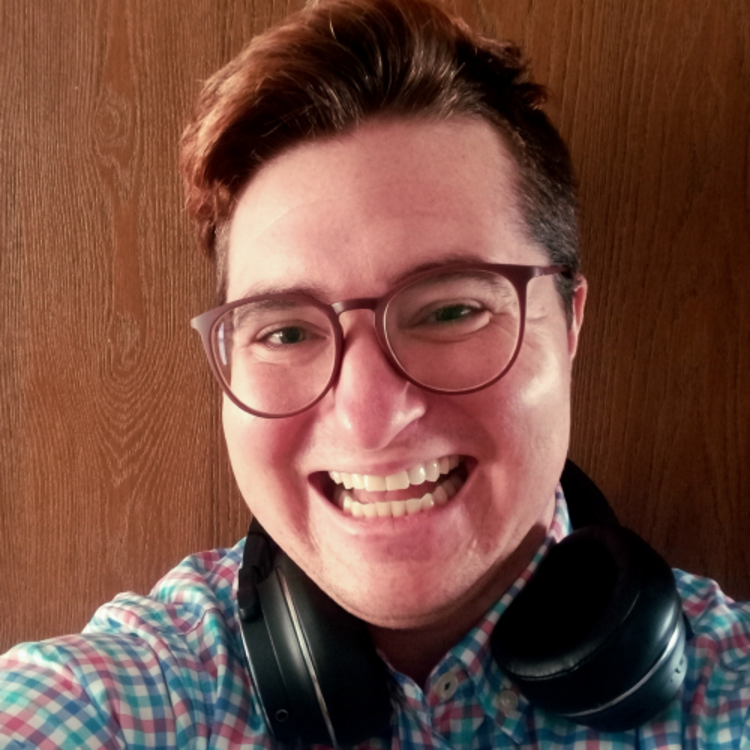
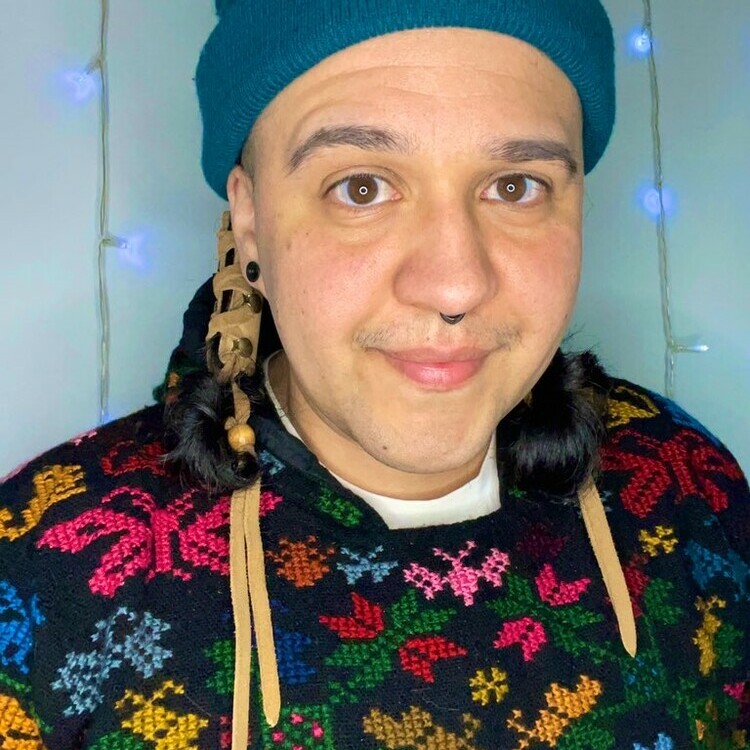
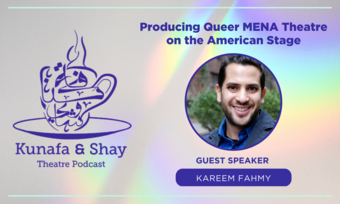



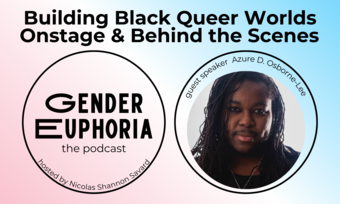


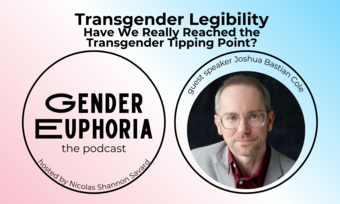

Comments
The article is just the start of the conversation—we want to know what you think about this subject, too! HowlRound is a space for knowledge-sharing, and we welcome spirited, thoughtful, and on-topic dialogue. Find our full comments policy here